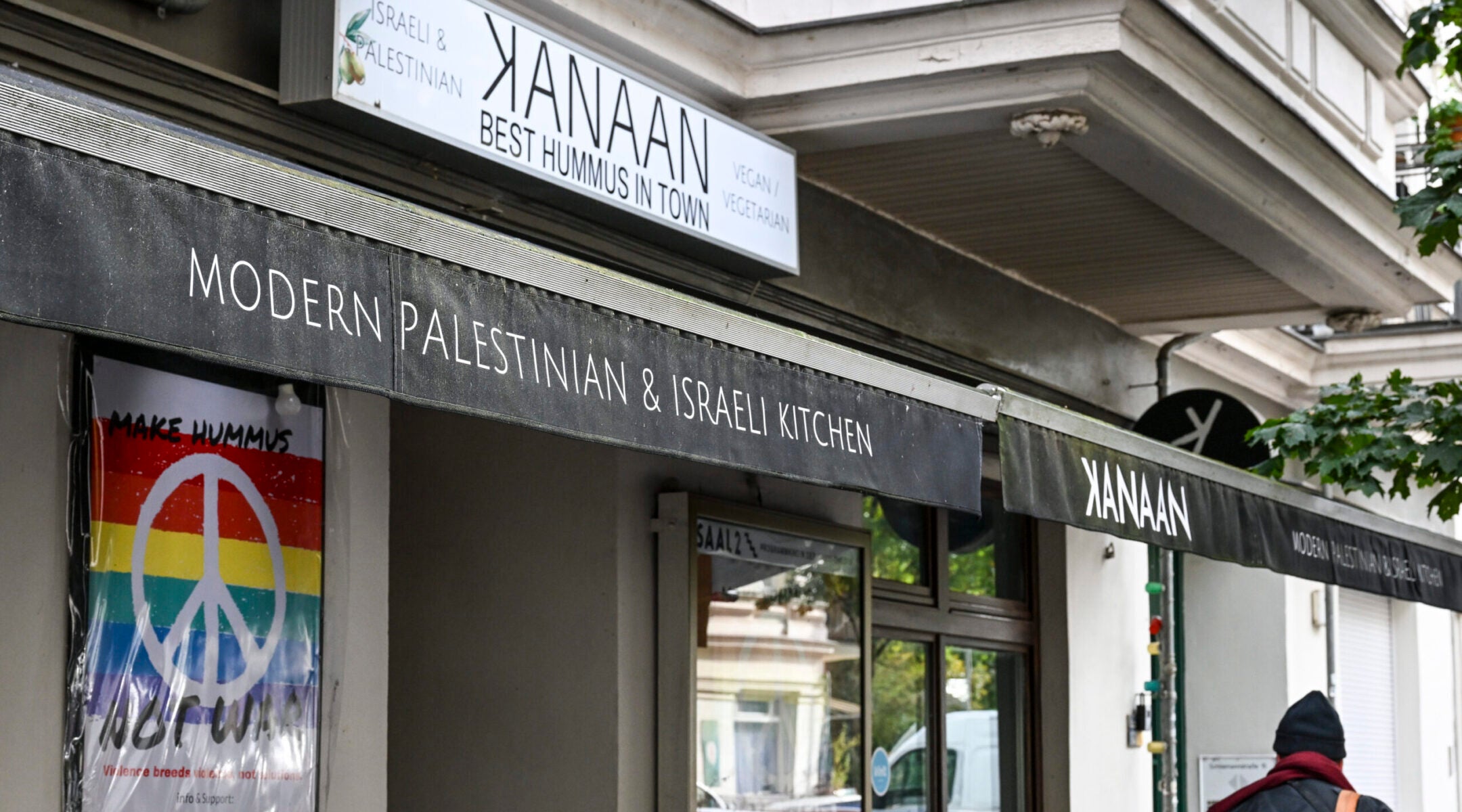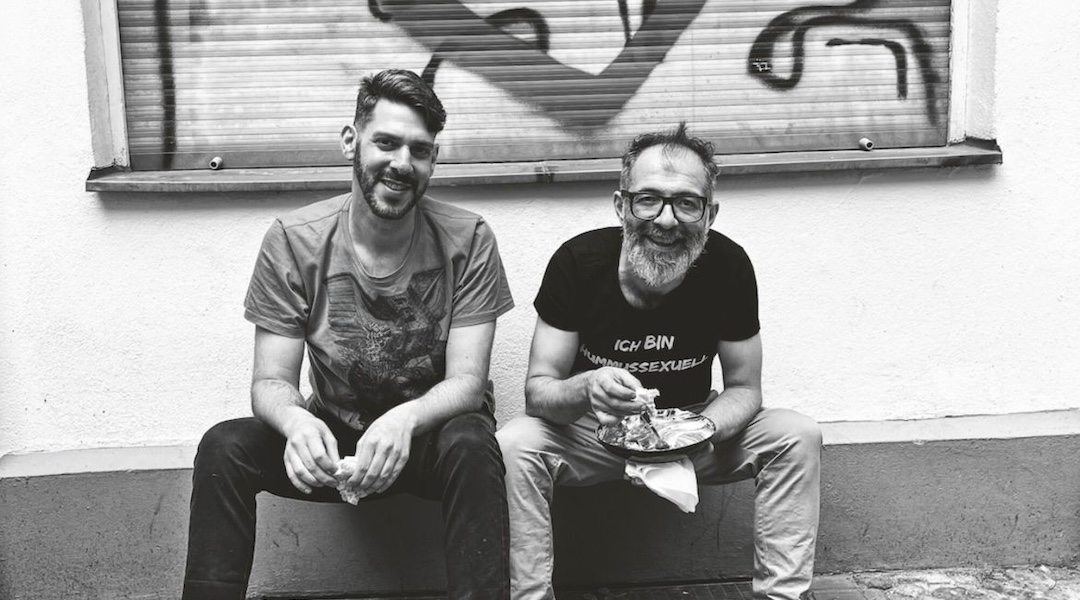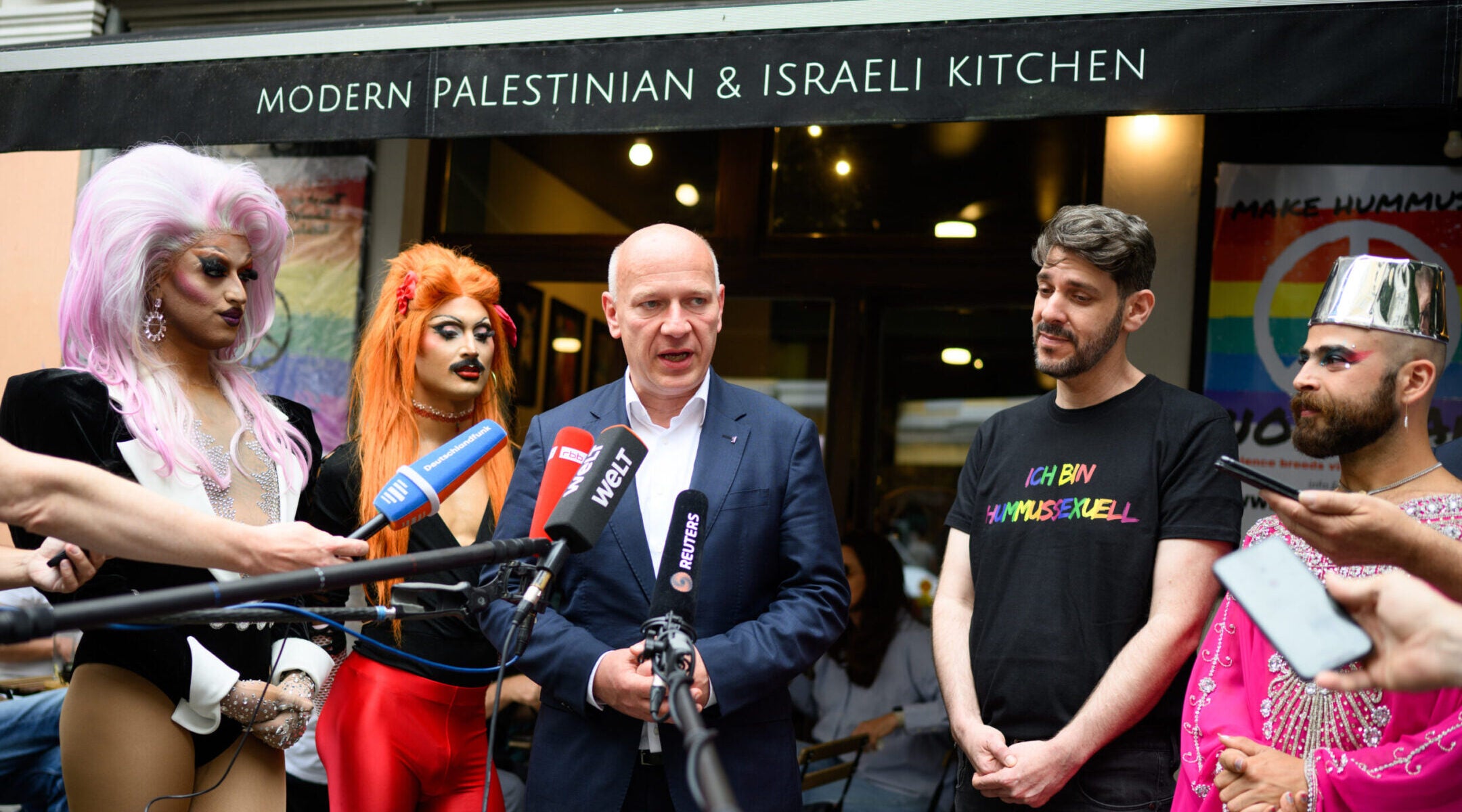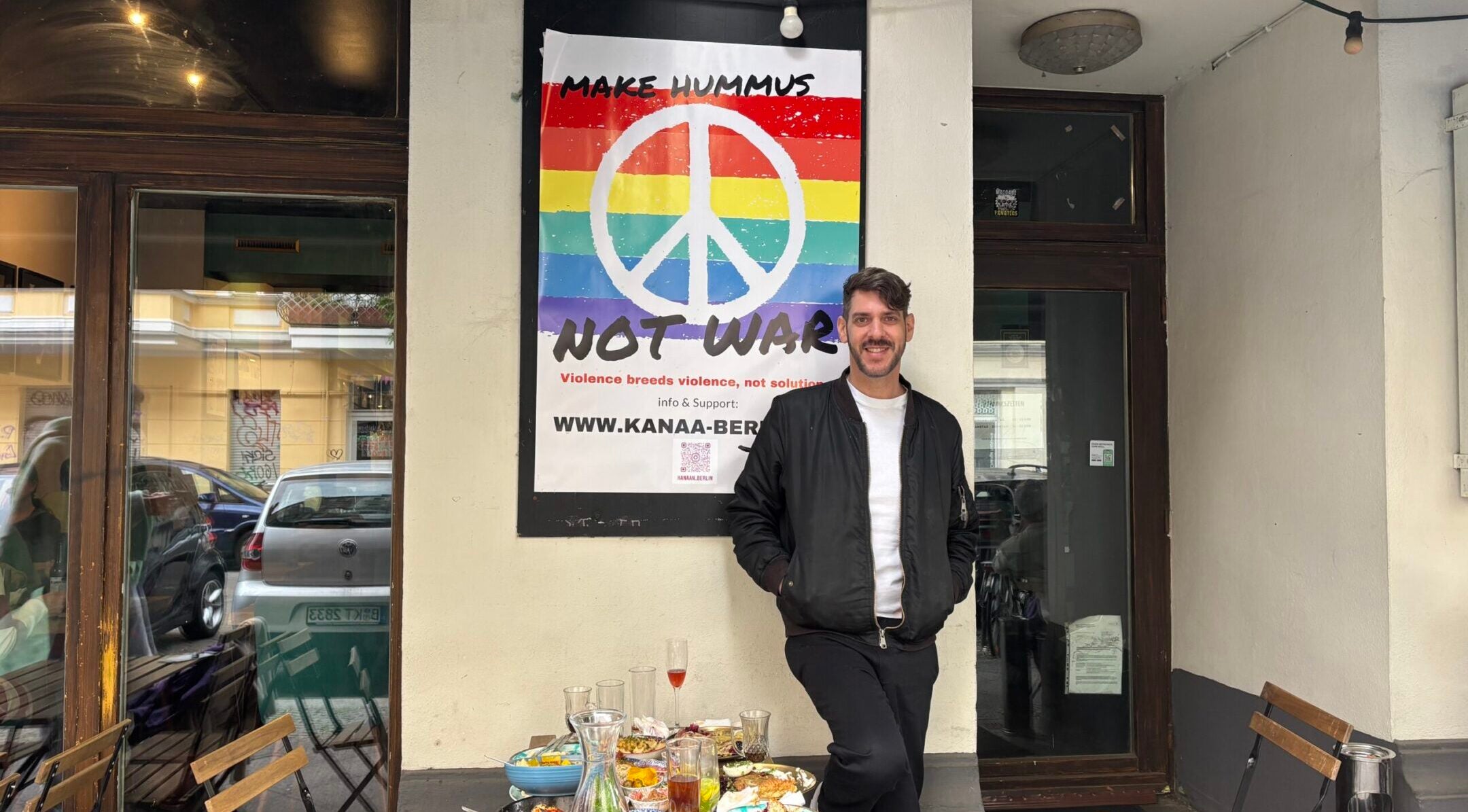Uncategorized
War battered their Berlin hummus bar. But the Israeli-Palestinian partners behind Kanaan see a way forward.

BERLIN — At a hummus restaurant in Berlin’s leafy neighborhood of Prenzlauer Berg, war has come knocking many times over the last two years. Recently, it came with the threat of closure.
Jalil Dabit, a Palestinian, and Oz Ben David, an Israeli, have run the business together for 10 years. The last two saw Hamas’ Oct. 7 attack on Israel and the devastating war that ensued in Gaza, killing tens of thousands of Palestinians and largely reducing the enclave to rubble.
Dabit and Ben David named their restaurant Kanaan — a Hebrew and Arabic word for the ancient land they both call home, before it was known as Israel or Palestine.
They have a mission beyond bringing the best hummus to Berlin. They turned Kanaan into a local symbol of Israeli-Palestinian dialogue, organizing free programs that teach about cooking and prejudice. One project joined Palestinian refugees who fled Gaza during the war together with members of Berlin’s Israeli community to cook under one roof. A rainbow sign outside the restaurant reads, “Make hummus not war.”
But in August, the partners issued an emergency plea.
“Kanaan is facing closure,” they announced to customers. “The year 2025 was tough. War, economic uncertainty and a sharp drop in revenue have brought us to a point where we cannot continue without your help. If nothing changes in the next two weeks, we will have to close Kanaan.”
Dabit and Ben David have continuously fended off the Gaza war’s encroachment on their business. On Oct. 7, 2023, they closed for six days. Ben David said he felt driven to quit after his friend was killed and his family members hid in their safe room from the Hamas attack on Kibbutz Be’eri. Dabit coaxed him back from despair.

Jalil Dabit, right, wears a shirt that translates to “I am a hummussexual.” He and Oz Ben David opened Kanaan in 2015. (Elisabeth Patrikiou)
The unlikely duo supported each other even as their message cost them Israeli and Palestinian friends from home. Ben David grew up in Ariel, an Israeli settlement in the West Bank; Dabit comes from Ramle, a mixed city in central Israel where his family has lived for hundreds of years. He had 16 family members in Gaza when the war broke out, all of whom since escaped to Australia.
In Berlin, their restaurant has been tested by tensions over the war. Both far-right and far-left factions have protested the “normalization” of an Israeli and a Palestinian working together.
In July 2024, Kanaan was vandalized after hosting a Jewish-Muslim brunch. The attackers shattered wine glasses, destroyed furniture, spread excrement and left hate messages throughout the restaurant. With nothing stolen, police suspected the vandalism to be motivated by hate. Months later, an Israeli woman was assaulted by four people while wearing Kanaan’s signature pin, which depicts a heart divided between the Israeli and Palestinian flag. One of the attackers shouted “Israel muss weg,” or “Israel must go,” while they knocked the woman to the ground and kicked her.
More recently, Ben David said they faced a downturn in revenue. Their customers were dwindling and they struggled to keep up with rising costs and high rent. He reached out to an email list of previously loyal customers, asking for feedback about why they weren’t returning. The responses weren’t about the food.
One answer came back clearly: People couldn’t figure out how to place Kanaan’s message of dialogue and coexistence. “‘We don’t understand if you are pro-Israel or pro-Palestine.’ That’s something that we heard a lot,” said Ben David.

Berlin Mayor Kai Wegner visits Kanaan following a break-in and vandalism at the Israeli-Palestinian restaurant, July 26, 2024. (Bernd von Jutrczenka/picture alliance via Getty Images)
Another response came down to fatigue with the Israeli-Palestinian conflict. After reading and watching news about the war for two years, when they finally had a break, many customers said they’d rather go out for sushi or Italian food.
Two weeks from bankruptcy, Ben David and Dabit tried to explain the restaurant’s significance to their community. “Kanaan was never just a restaurant,” they wrote on social media. “It’s a place where Israelis and Palestinians work together, where all guests eat together, where food is more than just enjoyment. … It’s a bridge between people.”
The following weeks saw a stunning change in fortune. Kanaan filled up again with a 300% increase in diners. Catering orders poured in, while many customers bought vouchers for the future. The support wasn’t just financial, said Dabit.
“When people react to our call, they give me — not just Kanaan, but also Oz and me — they give us the energy to continue,” he said. “They show us that we’re doing something right, even though it’s a really bad situation, but we’re doing something right.”

Oz Ben David poses outside the restaurant he owns with Jalil Dabit in Berlin, August 2025. (Shira Li Bartov)
For now, the restaurant can keep going. And the partners have new inspiration for their persistent hope: Back home, the first phase of a ceasefire agreement between Israel and Hamas saw the last 20 surviving Israeli hostages returned in exchange for 1,968 Palestinian prisoners on Monday, as scenes of ecstatic reunions and continued grief washed over Israel, Gaza and the West Bank.
Dabit and Ben David said they were filled with joy and relief, mixed with yearning for a lasting peace and reconciliation.
“The ceasefire feels like a breath of fresh air after so much suffering,” said Dabit. “It’s bittersweet, but it’s an opportunity for change. This is our chance to write a new narrative for our future.”
In Kanaan’s backyard, the Gaza war triggered a sharp rise in antisemitic and anti-Muslim incidents across Germany. It also drove a fraught debate over Germany’s relationship with Israel, which became central to German national identity after the Holocaust. Unlike other European countries that have recently recognized a Palestinian state, including the United Kingdom, France, Belgium, Portugal and Spain, Germany has declined to do so.
Pro-Palestinian protests in Berlin have also led to government crackdowns. In April, German immigration authorities ordered the deportation of three European nationals and one U.S. citizen over their alleged activity at pro-Palestinian demonstrations. Three of the orders cited Germany’s responsibility toward Israel — a doctrine known as the country’s “Staatsräson,” or “reason of state.” (All the protesters have appealed and won measures for interim relief.)

Oz Ben David, at left, and Jalil Dabit, center, co-owners of the Israeli-Palestinian restaurant Kanaan in Berlin arrive for talks titled “War in the Middle East: For a peaceful life together in Germany,” at the presidential Bellevue Palace in Berlin, Nov. 8, 2023. (Odd Anderson / AFP via Getty Images)
Dabit and Ben David plan to shape the conversations about Israelis, Palestinians, Jews and Muslims in Germany through projects beyond their restaurant. On Nov. 5, they will publish a cookbook titled “Kochen ohne Grenzen,” or “Cooking Without Borders.” The book collects their recipes while also sharing their kitchen with Berliners from around the world — including rabbis, imams and priests who cook together.
During a recent phone call between Dabit in Ramle and Ben David in Berlin, they jokingly interrupted each other’s stories about their families with accusations of “propaganda.” Turning serious, Dabit said, “I’m optimistic because I see the beauty of every person. If I couldn’t see the beauty, I couldn’t be with you for 10 years, Oz.”
“That’s true,” replied Ben David. “You managed to take a settler from Ariel and make him your best friend, like your brother.”
—
The post War battered their Berlin hummus bar. But the Israeli-Palestinian partners behind Kanaan see a way forward. appeared first on Jewish Telegraphic Agency.
Uncategorized
‘It never goes away’: A former hostage describes the paradox of freedom for Israelis who returned home from Gaza

Barry Rosen knows what it means to wait for freedom.
He spent 444 days as a hostage, one of 52 Americans held prisoner at the U.S. embassy in Iran from 1979 to 1981. He described when he was reunited with his family as “one of the greatest moments” of his life.
But Rosen also knows from experience that the psychological scars of captivity endure long after that celebratory moment.
So when he heard that the remaining living hostages held by Hamas in Gaza were being released this week, he felt “overwhelmingly relieved.” But his joy was also tempered by worries of what comes next, and the memory of the difficulties he faced re-entering society after being stripped of freedom for so long.
“It never goes away,” said Rosen, now 81. “Being a hostage is part of my DNA.”
444 days of darkness
Rosen, who is Jewish and grew up in Brooklyn, fell in love with Iranian culture during his time as a Peace Corps officer there. A decade later, he returned to work as a press attaché at the U.S. Embassy in Tehran.
On November 4, 1979, he was sitting in the embassy office when men with clubs stormed in and accused him of spying for the U.S. government.
Over the next nearly year and a half, he endured brutal conditions: Rosen was kept in a cell with no windows, subjected to mock executions, starved, and beaten, he said. He often feared he would never be released, telling his prison guards he expected them to grow old together.
Small reminders of the outside world helped him. The singular time his captors allowed him outside for 15 minutes, he slipped a blade of grass into his pocket — and would think of the baseball games he attended with his father as a young boy whenever he took it out.
Meanwhile, Rosen’s wife, Barbara, became a national figure, speaking to the media and meeting with politicians to advocate for his release.
President Jimmy Carter ultimately brokered a deal. After 444 days in captivity, Rosen was blindfolded and driven to the airport in Tehran. Soon after, he was in his family’s arms.
They popped champagne, he said, and “drank as much as they possibly could.”
The road to recovery
After the initial elation of being freed, Rosen said it took several months before he was able to resume a semblance of normal life.

Following his release, he went on a speaking tour and co-wrote a book with his wife, The Destined Hour: The Hostage Crisis and One Family’s Ordeal. Writing about his experience, he said, helped him process what had occurred.
Rosen also channeled the trauma into advocacy for other hostages. He co-founded Hostage Aid Worldwide, which researches unlawful detention and maintains a database of hostages around the world. In 2022, he went on a hunger strike to raise awareness of the plight of foreign nationals held by Iran. Most recently, he turned his attention to the hostages in Gaza, helping to schedule meetings between hostage families and officials at the United Nations.
Rosen said he feels a “certain camaraderie” with the hostages returning to Israel from Gaza, many of whom were confined to underground tunnels in darkness.
“The human condition is similar when you’re held under a gun or tied up, not knowing whether you will live or die,” he said.
He emphasized that some returning hostages may not be ready to speak about their experiences and stressed the importance of respecting how different people may process trauma.
Even small choices, like deciding what to eat, can bring up emotions for returning hostages.
“You’re being held for so long without any power over anything,” Rosen said. “If you’re now given a choice to do this or do that, it could be very difficult.”
On his speaking tours, Rosen said it was often challenging to translate the experience of being a hostage to an audience. When asked, “How does it feel to be a hostage?” he would reply that the experience was too complex to describe.
“I don’t particularly think that most people want to hear the pain,” Rosen said. “It’s something that cannot really be conveyed to another person, even if you’re the most articulate person in the world.”
The post ‘It never goes away’: A former hostage describes the paradox of freedom for Israelis who returned home from Gaza appeared first on The Forward.
Uncategorized
War battered their Berlin hummus bar. But the Israeli-Palestinian partners behind Kanaan see a way forward.

(JTA) — BERLIN — At a hummus restaurant in Berlin’s leafy neighborhood of Prenzlauer Berg, war has come knocking many times over the last two years. Recently, it came with the threat of closure.
Jalil Dabit, a Palestinian, and Oz Ben David, an Israeli, have run the business together for 10 years. The last two saw Hamas’ Oct. 7 attack on Israel and the devastating war that ensued in Gaza, killing tens of thousands of Palestinians and largely reducing the enclave to rubble.
Dabit and Ben David named their restaurant Kanaan — a Hebrew and Arabic word for the ancient land they both call home, before it was known as Israel or Palestine.
They have a mission beyond bringing the best hummus to Berlin. They turned Kanaan into a local symbol of Israeli-Palestinian dialogue, organizing free programs that teach about cooking and prejudice. One project joined Palestinian refugees who fled Gaza during the war together with members of Berlin’s Israeli community to cook under one roof. A rainbow sign outside the restaurant reads, “Make hummus not war.”
But in August, the partners issued an emergency plea.
“Kanaan is facing closure,” they announced to customers. “The year 2025 was tough. War, economic uncertainty and a sharp drop in revenue have brought us to a point where we cannot continue without your help. If nothing changes in the next two weeks, we will have to close Kanaan.”
Dabit and Ben David have continuously fended off the Gaza war’s encroachment on their business. On Oct. 7, 2023, they closed for six days. Ben David said he felt driven to quit after his friend was killed and his family members hid in their safe room from the Hamas attack on Kibbutz Be’eri. Dabit coaxed him back from despair.
The unlikely duo supported each other even as their message cost them Israeli and Palestinian friends from home. Ben David grew up in Ariel, an Israeli settlement in the West Bank; Dabit comes from Ramle, a mixed city in central Israel where his family has lived for hundreds of years. He had 16 family members in Gaza when the war broke out, all of whom since escaped to Australia.
In Berlin, their restaurant has been tested by tensions over the war. Both far-right and far-left factions have protested the “normalization” of an Israeli and a Palestinian working together.
In July 2024, Kanaan was vandalized after hosting a Jewish-Muslim brunch. The attackers shattered wine glasses, destroyed furniture, spread excrement and left hate messages throughout the restaurant. With nothing stolen, police suspected the vandalism to be motivated by hate. Months later, an Israeli woman was assaulted by four people while wearing Kanaan’s signature pin, which depicts a heart divided between the Israeli and Palestinian flag. One of the attackers shouted “Israel muss weg,” or “Israel must go,” while they knocked the woman to the ground and kicked her.
More recently, Ben David said they faced a downturn in revenue. Their customers were dwindling and they struggled to keep up with rising costs and high rent. He reached out to an email list of previously loyal customers, asking for feedback about why they weren’t returning. The responses weren’t about the food.
One answer came back clearly: People couldn’t figure out how to place Kanaan’s message of dialogue and coexistence. “‘We don’t understand if you are pro-Israel or pro-Palestine.’ That’s something that we heard a lot,” said Ben David.
Another response came down to fatigue with the Israeli-Palestinian conflict. After reading and watching news about the war for two years, when they finally had a break, many customers said they’d rather go out for sushi or Italian food.
Two weeks from bankruptcy, Ben David and Dabit tried to explain the restaurant’s significance to their community. “Kanaan was never just a restaurant,” they wrote on social media. “It’s a place where Israelis and Palestinians work together, where all guests eat together, where food is more than just enjoyment. … It’s a bridge between people.”
The following weeks saw a stunning change in fortune. Kanaan filled up again with a 300% increase in diners. Catering orders poured in, while many customers bought vouchers for the future. The support wasn’t just financial, said Dabit.
“When people react to our call, they give me — not just Kanaan, but also Oz and me — they give us the energy to continue,” he said. “They show us that we’re doing something right, even though it’s a really bad situation, but we’re doing something right.”
For now, the restaurant can keep going. And the partners have new inspiration for their persistent hope: Back home, the first phase of a ceasefire agreement between Israel and Hamas saw the last 20 surviving Israeli hostages returned in exchange for 1,968 Palestinian prisoners on Monday, as scenes of ecstatic reunions and continued grief washed over Israel, Gaza and the West Bank.
Dabit and Ben David said they were filled with joy and relief, mixed with yearning for a lasting peace and reconciliation.
“The ceasefire feels like a breath of fresh air after so much suffering,” said Dabit. “It’s bittersweet, but it’s an opportunity for change. This is our chance to write a new narrative for our future.”
In Kanaan’s backyard, the Gaza war triggered a sharp rise in antisemitic and anti-Muslim incidents across Germany. It also drove a fraught debate over Germany’s relationship with Israel, which became central to German national identity after the Holocaust. Unlike other European countries that have recently recognized a Palestinian state, including the United Kingdom, France, Belgium, Portugal and Spain, Germany has declined to do so.
Pro-Palestinian protests in Berlin have also led to government crackdowns. In April, German immigration authorities ordered the deportation of three European nationals and one U.S. citizen over their alleged activity at pro-Palestinian demonstrations. Three of the orders cited Germany’s responsibility toward Israel — a doctrine known as the country’s “Staatsräson,” or “reason of state.” (All the protesters have appealed and won measures for interim relief.)
Dabit and Ben David plan to shape the conversations about Israelis, Palestinians, Jews and Muslims in Germany through projects beyond their restaurant. On Nov. 5, they will publish a cookbook titled “Kochen ohne Grenzen,” or “Cooking Without Borders.” The book collects their recipes while also sharing their kitchen with Berliners from around the world — including rabbis, imams and priests who cook together.
During a recent phone call between Dabit in Ramle and Ben David in Berlin, they jokingly interrupted each other’s stories about their families with accusations of “propaganda.” Turning serious, Dabit said, “I’m optimistic because I see the beauty of every person. If I couldn’t see the beauty, I couldn’t be with you for 10 years, Oz.”
“That’s true,” replied Ben David. “You managed to take a settler from Ariel and make him your best friend, like your brother.”
The post War battered their Berlin hummus bar. But the Israeli-Palestinian partners behind Kanaan see a way forward. appeared first on The Forward.
Uncategorized
Why is everyone laughing at Anne Frank?

It’s hard to explain exactly what Slam Frank is. It’s a musical about Anne Frank in the hip-hop style of Lin-Manuel Miranda, but also with a touch of Bob Fosse. Anne is Latina and queer; her mother, Edith, is Black.
This is not race-blind casting. It’s very much on purpose, a way to leverage Anne Frank’s story for a send-up of identity politics. If that sounds pretty offensive, well, that’s kind of the point.
Slam Frank began as a parody video posted to Instagram by Andrew Fox, who is Jewish; online, he played the part of a theater director trying to create a chance for “Latinx girlies to feel seen, to feel included, to feel like they’re a part of the Holocaust.” Despite — or, perhaps, because — of how edgy the concept was, the social media account went so viral that it birthed a full-fledged show. Or, arguably, two; the conceit is a play within a play, a production of Anne Frank staged by a theater troupe working to “decolonize” the Holocaust.
The show’s jokes aren’t really focused on Anne Frank, or Anita Franco, as she is dubbed in the play. Instead, they skewer woke culture. Otto, Anita’s father, is neurodivergent, a fact he reminds everyone of about once every five minutes. Peter Van Daan, Anita’s crush, realizes they’re nonbinary, leading to an entire musical number in which each resident of the Annex discovers their own marginalized identity. “Every woman is a Jew hiding in her own attic,” warbles one character about her newly realized feminism. It culminates with the cast ripping off their yellow stars to replace them with pronoun pins in the same shape.

A few years ago, Slam Frank would have been unimaginable. But at a sold-out performance late on a Tuesday, the audience was eating it up like they’d been starving for years. The laughter was so raucous that it could occasionally be hard to hear the dialogue.
The question is what changed so that a New York audience could laugh so heartily and so openly at jokes making fun of disabilities, race, ethnicity and sexual orientation — jokes that just a few years ago would have gotten someone canceled by a full-fledged angry online mob. Even today, there is a fully-serious Latinx production of The Diary of Anne Frank going up in Los Angeles, which the director said was meant to provoke discussion about immigration in the U.S.
It’s not that people aren’t upset; some writers for Jewish publications have accused the show of going “too far.” Reducing the focus on Jewish victims is, sometimes, a tactic of Holocaust deniers or distorters. People get defensive. Fox said the show got kicked out of a workshop program.
But Slam Frank isn’t really about the Holocaust; it’s about what happens when we talk about the Holocaust in an era in which certain identities are not considered oppressable.
Fox was inspired by a viral Twitter thread from 2021 that accused Anne Frank of white privilege, calling her a “colonizer.” I wrote about this discourse at the time; ahistorical discussions of Anne Frank’s purported whiteness were cropping up every few months during that period, as the Black Lives Matter protests and the pandemic brought identity politics to the main stage.
This discourse, while obviously absurd — Jews in the 1930s were not considered white — was nevertheless taken somewhat seriously in some circles. So, to make Anne Frank more unambiguously sympathetic, Fox assigned her and her compatriots in the Annex every extra identity she might need to qualify for victimhood.
Anne Frank’s story is particularly well-suited to a send-up of identity politics. Not only is it a narrative that most people know well — which is important since Slam Frank can sometimes be so focused on its one-liners that the beats of the story get muddled — but the Holocaust has become the archetype of the oppressor-oppressed dynamic. Online, anyone who is persecuting anyone else is quickly labeled a Nazi or called Hitler; the Jews, then, become the archetypal victim. It’s fertile ground for satirizing the so-called oppression Olympics.
For all its lambasting of a type of political correctness usually associated with the left, however, Slam Frank is not a conservative or right-wing production, though it’s also clearly not “woke.” It’s a hard show to pin down; it feels like a Rorschach test in ideology. Or, to better reflect its social media roots, it feels like one giant exercise in trolling.
Going off of the bonafides and bios of the cast and creative team, however, there are hints that the show is at least somewhat identified with the very culture it’s skewering. Olivia Bernábe, who plays Anita, uses they/them pronouns in real life, despite all the show’s jokes about pronouns. Joel Sinensky, who wrote the book, has worked on another project with Chapo Traphouse, the podcast king of the dirtbag left — a brand of leftism that rejects the etiquette of the left while retaining its political aims.
It seems safe to infer that the show’s critiques are from within the liberal milieu it’s satirizing. Sigmund Freud, in a lengthy text on humor — Jokes and their Relation to the Unconscious — theorized at one point that “every joke calls for a public of its own” and that sharing the joke demonstrates “psychical conformity.” So the question becomes when, and why, the left finally became comfortable laughing at itself.

Some of Slam Frank’s jokes do go a bit far — there are, of course, big and important lessons to learn about the way systemic oppression still operates in society, and it was good that we spent the past few years grappling with them. The show makes fun of the idea that a group hiding from the Nazis would be worried about such trivial problems as the perfect label for their sexuality, but the real Anne Frank did grapple with her sexual feelings toward both boys and girls in her diary.
Still, most of Slam Frank’s jokes are not laughing at people’s identities themselves, which saves it from seeming mean-spirited. The butt of the joke is not that Peter is nonbinary or that Edith is Black or that Otto is neurodivergent, it’s the way the fellow residents of the Annex react to these labels.
And even if Slam Frank sometimes overshoots the mark, it’s reclaiming something else: funniness.
After Kamala Harris lost to Donald Trump in the presidential election, more and more pundits began to point out that scolding voters is not a winning strategy. Liberals had somehow made their brand into telling people off while Republicans, once known for stodgy lectures about tradition and sexual mores, became the party of fun. They embraced Trump’s bad dancing as a delightful meme. They threw parties in the hottest bars in the city. Most importantly, they made jokes and didn’t chastise anyone for laughing at them.
The way for the left to come back from such bad branding is to learn how to laugh at itself. And self-deprecating humor is what Jews are best known for — that and the Holocaust. So maybe turning Anne Frank into a joke isn’t so strange after all.
The post Why is everyone laughing at Anne Frank? appeared first on The Forward.


